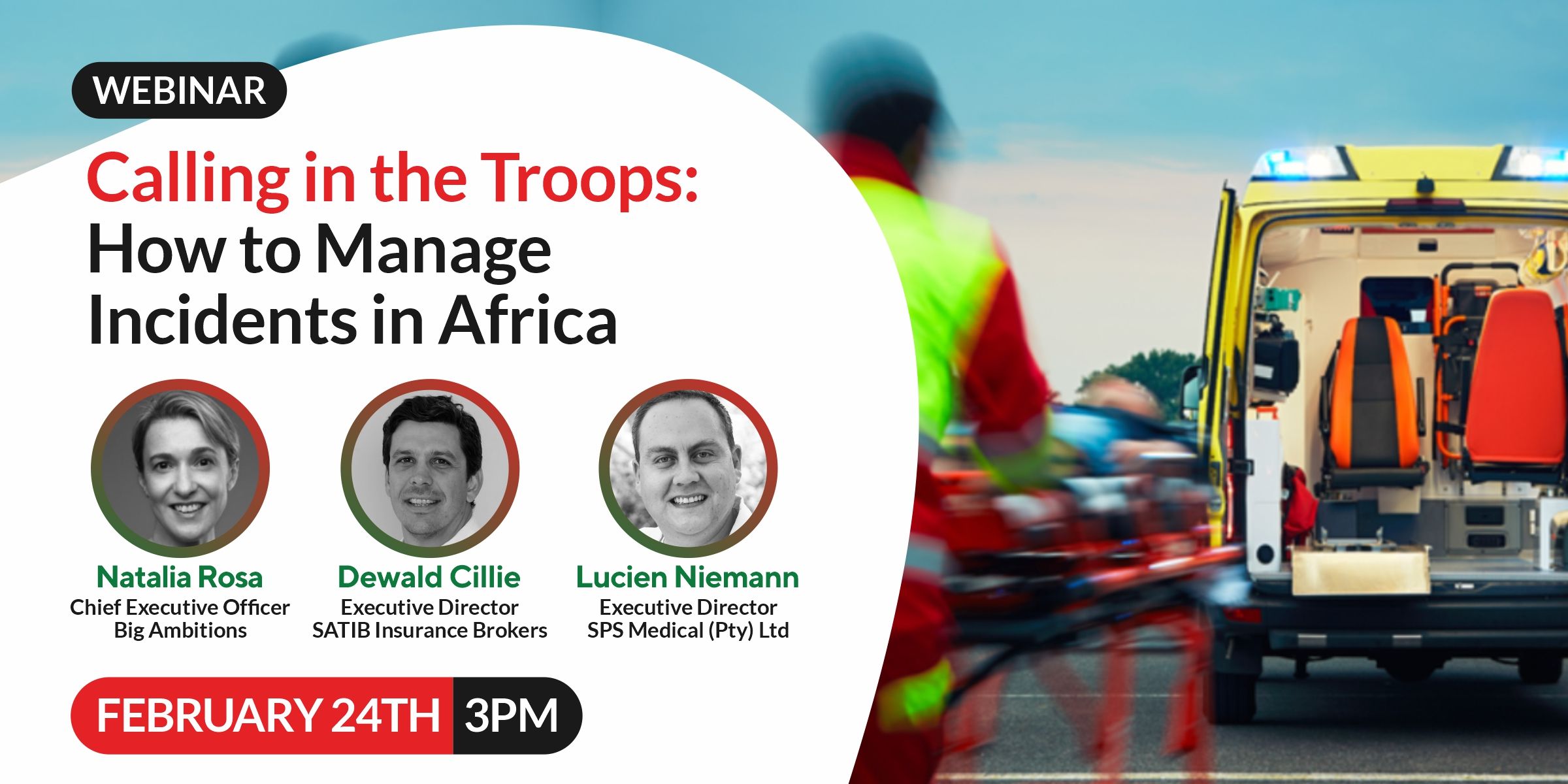Medical emergencies are always complex, given the number of individuals and entities involved. But when those emergencies happen in Africa, another layer of difficulty is added by factors such as vast distances, rural locations, and inadequate medical facilities – and that means a little extra assistance is needed to make the best outcomes possible.
The form that assistance should take came under the spotlight in a recent webinar hosted by Dewald Cillie of SATIB, Lucienne Nieman of SATIB24 and Natalia Rosa of Big Ambitions.
The panel examined a real-life example to demonstrate the importance of proper incident management: SATIB24 received a call from a lodge in the North West Province, requesting assistance for a 76-year-old guest who had a bleeding cut on his head. After asking several questions, the operator who took the call ascertained that the cut had come about after the guest fell and hit his head. He fell asleep, but collapsed again after waking up, this time hitting his head on the counter in the bathroom.
This is when SATIB24 was asked to intervene. The Incident Management Centre established a differential diagnosis (a diagnosis based on the evidence available without further testing) and determined that the patient might be suffering from one of several different conditions, all of which were sufficiently severe to warrant urgent evacuation.
SATIB24 set about trying to secure the services of an ambulance – but found that the service provided by the nearest town wasn’t available. In fact, the only ambulance that would be able to transport the patient was located two and a half hours from the lodge, and refused to provide the service because of this distance. It was time to move to Plan B: a helicopter evacuation. Unfortunately, this option proved to have challenges, too, as the patient’s medical aid would not authorise the evacuation, based on the fact that there was no medical expert on the scene to provide assistance. This meant that it was not viewed as a valid case.
Authorisation was finally obtained from SATIB – but, still, the patient’s trials were far from over. With no beds available in the nearest hospital equipped with a cardiac unit, SATIB24 had to keep trying different hospitals until, finally, the patient could be admitted.
Although this has the ring of an epic saga, all of this took place within just one and a half hours – and the good news is that the patient made a full recovery after a proper diagnosis, treatment and a brief stay in ICU.
Of course, the outcome could have been very different – which is why it is critical for establishments to be fully prepared. By definition, an incident is an unplanned or unexpected event, and this is precisely what makes them so hard to handle. That said, there are several steps that can be taken to ensure that, when the unexpected transpires, you can respond quickly.
The first is to make sure that a comprehensive incident management plan is in place. SATIB24 has compiled a pack with vital information about which details need to be covered and which issues addressed, and this valuable resource can provide useful guidance which will cut down on the time taken to address the emergency.
At the very least, though, establishments should appoint a team that will be ready to take control and manage incidents as they arise. These people must understand their roles and responsibilities, and should be fully trained to handle a range of emergencies.
Every member of the organisation must know which number to dial in case of an emergency. This should be prominently displayed in areas like the reception, next to all telephones, and even in guest rooms. Employees should also have it programmed into their phones in case they don’t know it by heart. Phoning the right number can save critical minutes: in one case, a caller phoned their broker, requesting assistance for a broken down vehicle – when, in fact, a large number of people had been injured in an accident and required hospitalisation. This is why the first port of call should, always, be the Incident Management Centre, which is staffed by operators who know which questions to obtain the patient’s medical history, establish the scope of the emergency and, using this information, formulate an appropriate plan of action.
As much as it may seem like a good idea to provide what care you can, legal stipulations mean that any person who acts in the capacity of an expert when they do not, in fact, have the proper skills might find themselves being held criminally responsible if things go wrong. Their employer will also be held liable – which is why it critical to wait for a properly trained team to arrive on the scene and provide what treatment they can.
Because taking note of critical details can be time consuming, it’s a good idea for establishment owners to pre-load all details pertaining to their guests even before they arrive. While some entities may cite the POPIA Act as a deterrent to doing this, it’s worth remembering that the Act states that it is not necessary to obtain consent before sharing a patient’s details with a medical funder. Essentially, it requires that entities safeguard information, rather than preventing them from using it altogether – and having to hand information such as the patient’s date of birth, passport number, home address and (perhaps most importantly) booking reference and flight number can save valuable minutes when waiting for a travel insurer which is certain to withhold authorisation until this information is provided.
Finally, it is equally important to have a crisis communications strategy in place – failure to respond correctly to queries from the media about incidents may not only result in reputational damage, but may leave establishments open to legal liability, too. It’s wise to appoint a single spokesperson to handle all press queries, and to appoint a professional communications team (who may call in a legal expert, if deemed necessary), who can review all communication issued to the press, to ensure that these eventualities can be avoided.



